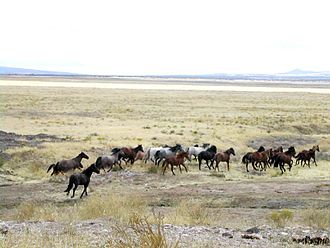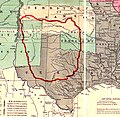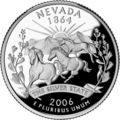Mustang
Mustang refers to a free-roaming horse of the American west that first descended from horses brought to the Americas by the Spanish. Mustangs are often referred to as wild horses, but because they are descended from once-domesticated animals, they are actually feral horses. The modern Mustang is a result of centuries of adaptation to environments in the western United States, and they have become a symbol of the American frontier.
History
The history of the Mustang is closely tied to the history of the Spanish in the Americas. Horses were reintroduced to the Americas by the Spanish in the 16th century; the ancestors of the Mustang were Spanish horses or originated from Spanish stock. These animals spread throughout the American Great Plains, often escaping from Spanish, Native American, and later, American settlers.
Over time, these horses mixed with other escaped or released horses, including those of English and Native American origin, leading to the diverse genetic makeup of the modern Mustang. The term "Mustang" itself comes from the Spanish word mestengo, meaning wild or stray animal.
Characteristics
Mustangs are known for their ruggedness and adaptability. They vary greatly in size, color, and build, reflecting their diverse ancestry. Common colors include bay, black, gray, and chestnut, but they can also be found in less common colors like palomino, paint, and pinto. Mustangs typically range in size from 14 to 15 hands (56 to 60 inches, 142 to 152 cm) tall at the shoulder and are known for their intelligence, speed, and endurance.
Habitat
Mustangs primarily roam the public lands in the western United States, particularly in states like Nevada, Wyoming, and Oregon. The Bureau of Land Management (BLM) manages these horses under the authority of the Wild Free-Roaming Horses and Burros Act of 1971, which aims to protect, manage, and control wild horses and burros to ensure healthy herds and rangelands.
Controversy
The presence of Mustangs on public lands has been a subject of controversy. Ranchers often view them as competition for grazing resources, while animal rights activists argue for their protection and freedom. The BLM conducts roundups to manage the population, which has led to debates about the humane treatment of these animals and the sustainability of current management practices.
Conservation
Efforts to conserve the Mustang include adoption programs that allow individuals to adopt a wild horse. These programs aim to reduce the population pressure on public lands while ensuring that Mustangs find homes where they can be cared for properly. Conservation groups also work to protect the habitats of wild horses and advocate for policies that ensure their humane treatment and survival.
Cultural Impact
The Mustang has a significant place in American culture, symbolizing freedom, independence, and the untamed nature of the American West. They have been featured in literature, film, and art, and continue to be an enduring symbol of American heritage.
Transform your life with W8MD's budget GLP-1 injections from $125.
W8MD offers a medical weight loss program to lose weight in Philadelphia. Our physician-supervised medical weight loss provides:
- Most insurances accepted or discounted self-pay rates. We will obtain insurance prior authorizations if needed.
- Generic GLP1 weight loss injections from $125 for the starting dose.
- Also offer prescription weight loss medications including Phentermine, Qsymia, Diethylpropion, Contrave etc.
NYC weight loss doctor appointments
Start your NYC weight loss journey today at our NYC medical weight loss and Philadelphia medical weight loss clinics.
- Call 718-946-5500 to lose weight in NYC or for medical weight loss in Philadelphia 215-676-2334.
- Tags:NYC medical weight loss, Philadelphia lose weight Zepbound NYC, Budget GLP1 weight loss injections, Wegovy Philadelphia, Wegovy NYC, Philadelphia medical weight loss, Brookly weight loss and Wegovy NYC
|
WikiMD's Wellness Encyclopedia |
| Let Food Be Thy Medicine Medicine Thy Food - Hippocrates |
Medical Disclaimer: WikiMD is not a substitute for professional medical advice. The information on WikiMD is provided as an information resource only, may be incorrect, outdated or misleading, and is not to be used or relied on for any diagnostic or treatment purposes. Please consult your health care provider before making any healthcare decisions or for guidance about a specific medical condition. WikiMD expressly disclaims responsibility, and shall have no liability, for any damages, loss, injury, or liability whatsoever suffered as a result of your reliance on the information contained in this site. By visiting this site you agree to the foregoing terms and conditions, which may from time to time be changed or supplemented by WikiMD. If you do not agree to the foregoing terms and conditions, you should not enter or use this site. See full disclaimer.
Credits:Most images are courtesy of Wikimedia commons, and templates, categories Wikipedia, licensed under CC BY SA or similar.
Contributors: Prab R. Tumpati, MD













